- Campuses :
- Twin Cities
- Crookston
- Duluth
- Morris
- Rochester
- Other Locations

center for writing
mwp.umn.edu
Karla Bisco
©2009
 Being Good
Being Good
My core belief is that people want to be good. You may say Anne Frank is my mentor when it comes to this life philosophy. People may not always know how to do what‘s right. They may have been led astray from a young age and as a result make harmful choices, but are they inherently evil? It seems so extreme to make this judgment. All of these thoughts remind me of a passage from The Master and Margarita. The quote that stuck out the most was, “Where would your good be without evil?” This makes me wonder, does this account for people doing awful things?
Recently, this lesson came to life when I was on a walk in quest of quiet joy. What better way to find this inner peace than on a meditative walk. While walking, suddenly I was dragged out of the inner workings of my thoughts by some unsettling movements made between a young couple. These movements signified that something might be wrong, so I put my senses on high alert. Indeed it happened again. His quick jabs to her chest were more obvious when I was truly paying attention. I responded quickly because I did not want my silence to give consent. “Do you need help?” I shouted in desperation. There was no response to my question. They never even turned their heads. The cycle of abuse was evident. She kept engaging him, trying to get something from him. He responded with the only strategy he had at his disposal.
As they turned the corner away from me their altercation persisted. At this point I yelled, “Hey, that’s not ok!” as I picked up my pace and walked in their direction. In that moment I felt overwhelmed with a feeling of powerlessness. I did my best to help and let my voice be heard for that young woman. I knew the surface pain would heal relatively quickly for her, but the damage to her psyche could be never ending.
I stood on the corner they had just turned and watched them get farther down the street away from me. I had no cell phone to call reinforcements and my voice was doing me no good. All I could do was watch them. I was glued in that spot unable to move from it. I looked around to see if anyone could help, but there was no one. My last line of defense was to show them that I was a witness. I would not turn my back and pretend that nothing was wrong.
They rounded the next corner to get away from me. When I couldn’t see them anymore my feet were able to budge from the place I had inhabited for what seemed like forever. As I walked away my thoughts turned to that young man. I had empathy for him even though he was the perceived aggressor. This may strike you as odd, but in the pit of my stomach I knew adults had let him down because they had not taught him another way. I wondered what his life was like and even who his teachers were. He was yet a child, despite his grown body. He needed guidance.
It was probably my empathy that saved me from the trauma of this relatively brief period of time. Otherwise, I might have cracked open right there on the street. The compassion I was feeling led my thoughts to a place of action. It made the power of teaching and what I need to do to help kids be healthy people even more crystal clear. Was this the good compared to the evil referred to in The Master and Margarita? Did I need this pivotal moment to strengthen my conviction about what kids need? Maybe this is what the author was trying to say. We all want to be sheltered from suffering, but maybe these experiences provide the contrast that brings good into perspective. If we are lucky, they even make us better people and call us to action.


